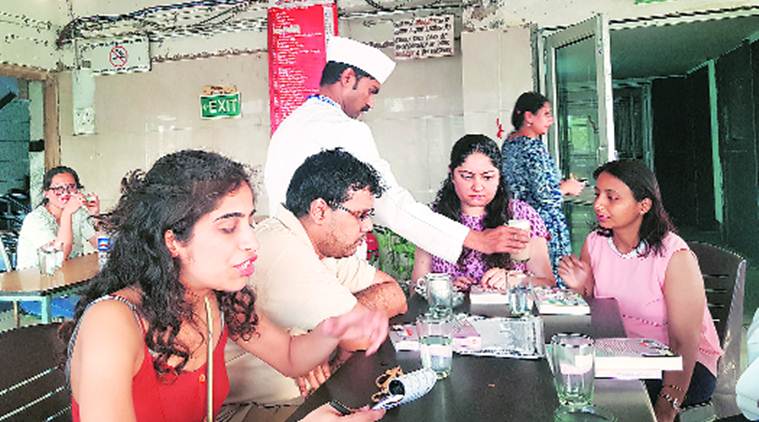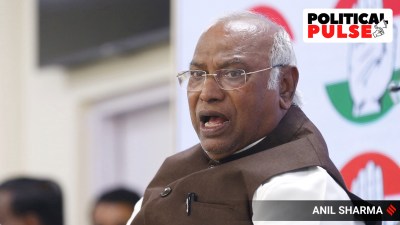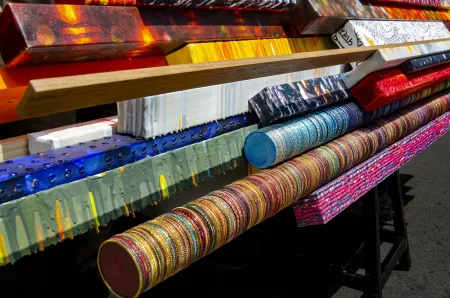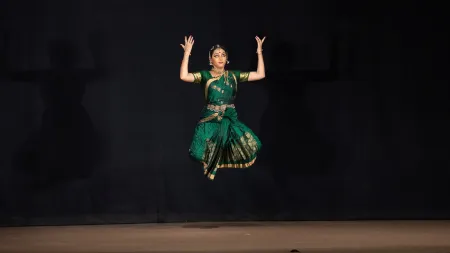- India
- International
A book-themed walk reels out how Delhi’s Indian Coffee House became a political hotspot in the ’70s
The lead character of the book, Indu, is named after the-then Prime Minister; her father was Chief Counsel to Indira Gandhi.
 Srishti Chaudhary (extreme left) with participants during the event in Delhi.
Srishti Chaudhary (extreme left) with participants during the event in Delhi.
“Political discussions not allowed”, said a board at the India Coffee House in Connaught Place. This was the ’70s, ahead of the Emergency. On a balmy Sunday evening, nearly four decades later, a group of history enthusiasts occupy the table at the same venue. The discussion was all but political. “Public opinion on the Emergency has always been extreme, but it can’t be one-sided. The idea of this evening is to narrate how things happened and exchange ideas,” declared Bela Upadhyay, Founder and Storyteller, Delhi Eventalist, who conducts several historical tours in the Capital.
But this was the first time a large part of her tour was a book discussion. Debutante author Srishti Chaudhary was co-hosting the event. Her recently released book Once Upon A Curfew (Penguin; Rs 299) is a fiction set in the Emergency era. She says it was a conscious choice. “I wanted to set it in the past. It would have an old-world charm to set the romance in the time when there were no cellphones or social media,” says the 25-year-old author, even as she admits that the Emergency was a tough and politically turbulent period for her to document.
The lead character of the book, Indu, is named after the-then Prime Minister; her father was Chief Counsel to Indira Gandhi. Even though she admired Gandhi all her life, by the end of the novel, she is disenchanted. As the narrative proceeds, Indu with her lover, Rana, a law student, takes readers through Delhi of the ’70s, with its politics, cinema and lifestyle.
They often meet at the Indian Coffee House, and that is where the two-hour tour started on Sunday, over cups of coffee and glasses of Rooh Afza. Upadhyay says, “The Emergency wasn’t imposed suddenly one day, it had been building up for some months and it was in those days when the cafe became a sort of meeting point for underground discussions.” She adds that while the Emergency was on — for 22 months starting June 1975 — there weren’t too many political meetings at the cafe since large gatherings were banned.
In the book though, there are discussions about Rajesh Khanna’s films and Kishore Kumar’s songs at the Indian Coffee House. It was during the Emergency that Kumar was “gagged on radio and public broadcasts after he refused to help push the government’s agenda”, says Chaudhary, adding that “the superstar persona of Rajesh Khanna gave way to the angry young man post-Emergency, and Amitabh Bachchan emerged as the next superstar”.

The cover of the book has Indu looking at Regal Cinema, standing in a corner of Palika Bazar, and that’s where Upadhyay took the participants towards the end, for photo-ops. The novel was part of Chaudhury’s dissertation while she was studying creative writing in Edinburgh.
More Lifestyle
Apr 19: Latest News
- 01
- 02
- 03
- 04
- 05



































